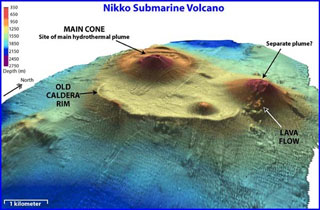Report on Nikko (Japan) — July 1979
Scientific Event Alert Network Bulletin, vol. 4, no. 7 (July 1979)
Managing Editor: David Squires.
Nikko (Japan) Water discoloration on 12 July 1979 first evidence of activity
Please cite this report as:
Global Volcanism Program, 1979. Report on Nikko (Japan) (Squires, D., ed.). Scientific Event Alert Network Bulletin, 4:7. Smithsonian Institution. https://doi.org/10.5479/si.GVP.SEAN197907-284132
Nikko
Japan
23.078°N, 142.326°E; summit elev. -392 m
All times are local (unless otherwise noted)
At Nikko, not previously known to be active, discolored water was seen on 12 July. A JMSA survey vessel recorded a depth of 612 m to Nikko's summit in 1977.
Geological Summary. Nikko submarine volcano is a massive seamount that rises from nearly 3 km depth to within 392 m of the ocean surface near the N end of the Mariana Volcanic Arc. Two large cones at the basaltic-to-andesitic volcano have been constructed on the NW and NE rims of a roughly 3-km-wide, flat-floored submarine caldera, whose rim is prominently displayed on the southern side, but largely buried on the north. A smaller cone is present on the SE caldera floor. The larger NW cone lies within a partially buried crater and displays hydrothermal activity. Discolored water was observed in July 1979, but none has been observed during semi-regular seasonal reconnaissance flights since then. Hydrothermal venting was documented during a NOAA expedition.
Information Contacts: JMA, Tokyo.

